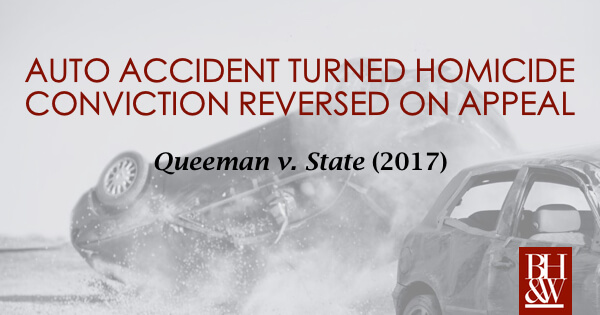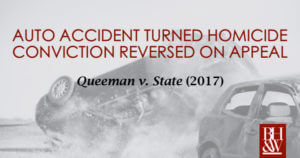
What is Criminal Negligence in Texas?
 In Texas, there are some criminal offenses for which a person can be liable if they acted with “criminal negligence.” When most people think of “negligence,” they think of a civil standard used in lawsuits for money damages. But criminal negligence, the courts have reasoned, is different from ordinary civil negligence.
In Texas, there are some criminal offenses for which a person can be liable if they acted with “criminal negligence.” When most people think of “negligence,” they think of a civil standard used in lawsuits for money damages. But criminal negligence, the courts have reasoned, is different from ordinary civil negligence.
Section 6.03(d) of the Texas Penal Code states that “a person acts with criminal negligence, or is criminally negligent, with respect to circumstances surrounding his conduct or the result of his conduct when he ought to be aware of a substantial and unjustifiable risk that the circumstances exist or the result will occur. The risk must be of such a nature and degree that the failure to perceive it constitutes a gross deviation from the standard of care that an ordinary person would exercise under all the circumstances as viewed from the actor’s standpoint.”
How does Criminal Negligence Differ from Civil Negligence in Texas?
Civil or simple negligence means the failure to use ordinary care, that is, failing to do that which a person of ordinary prudence would not have done under the same or similar circumstances. Montgomery v. State, 369 S.W.3d 188, 193 (Tex. Crim. App. 2012). Conversely, conduct that constitutes criminal negligence involves a greater risk of harm to others, without any compensating social utility, than does simple negligence. Id. The carelessness required for criminal negligence is significantly higher than that for civil negligence; the seriousness of the negligence would be known by any reasonable person sharing the community’s sense of right and wrong. Id. The risk must be substantial and unjustifiable, and the failure to perceive it must be a gross deviation from reasonable care as judged by general societal standards by ordinary people. Id.
For example: The Texas Court of Criminal Appeals has held that criminally negligent homicide requires not only a failure to perceive a risk of death, but also some serious blameworthiness in the conduct that caused it (i.e., risk must be “substantial and unjustifiable,” and the failure to perceive that risk must be a “gross deviation” from reasonable care).
In finding a defendant criminal negligent, a jury is determining that the defendant’s failure to perceive the associated risk is so great as to be worthy of a criminal punishment. The degree of deviation from reasonable care is measured solely by the degree of negligence, not any element of actual awareness. Whether a defendant’s conduct involves an extreme degree of risk must be determined by the conduct itself and not by the resultant harm. Nor can criminal liability be predicated on every careless act merely because its carelessness results in death or injury to another.
Case Law Examples of Criminal Negligence Standard in Texas
McKay v. State, 474 S.W.3d 266 (Tex. Crim. App. 2015): The Court of Criminal Appeals holding insufficient evidence of criminal negligence to support Defendant’s conviction for injury to a child after he spilled hot water on the two-year-old child while he was in the kitchen, because there was no evidence that Defendant failed to perceive a substantial and unjustifiable risk to the child. There was no showing that the child was often underfoot or that defendant knew the child could likely be under his feet while moving around in the kitchen.
Queeman v. State, 520 S.W.3d 616 (Tex. Crim. App. 2017): The Court of Criminal Appeals holding insufficient evidence to support defendant’s conviction of criminally negligent homicide because the evidence presented does not show that Defendant’s failure to maintain a safe driving speed and keep a proper distance from other vehicles was a gross deviation from the standard of care that an ordinary diver would exercise under all the circumstances as viewed from Defendant’s standpoint at the time of his conduct.
Tello v. State, 180 S.W.3d 150 (Tex. Crim. App. 2005): The Court of Criminal Appeals upheld Appellant’s criminal negligent homicide conviction reasoning that Appellant should have perceived a substantial and unjustifiable risk of death from using a faulty trailer hitch without safety chains on a public road. The homemade trailer unhitched from Appellant’s truck and killed a pedestrian.


 The Court of Criminal Appeals recently handed down an opinion in
The Court of Criminal Appeals recently handed down an opinion in 





